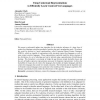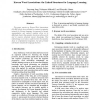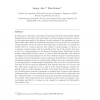3653 search results - page 87 / 731 » Learning of Partial Languages |
122
click to vote
COLT
2006
Springer
15 years 6 months ago
2006
Springer
Given a finite set of words w1, . . . , wn independently drawn according to a fixed unknown distribution law P called a stochastic language, an usual goal in Grammatical Inference ...
208
Voted
ICALT
2009
IEEE
15 years 9 months ago
2009
IEEE
A crucial challenge for improving EMLs is to provide an intuitive notation to support educational practitioners to not only understand, but also describe a large number of flexibl...
134
Voted
JMLR
2010
14 years 9 months ago
2010
We present a polynomial update time algorithm for the inductive inference of a large class of context-free languages using the paradigm of positive data and a membership oracle. W...
99
Voted
ICALT
2009
IEEE
15 years 9 months ago
2009
IEEE
This paper reports on Korean Word Associations (KorWA) which were collected to construct a semantic network for Korean language. An approach of graph representation and network an...
106
Voted
ALT
2004
Springer
15 years 11 months ago
2004
Springer
In this paper we introduce a paradigm for learning in the limit of potentially infinite languages from all positive data and negative counterexamples provided in response to the ...



